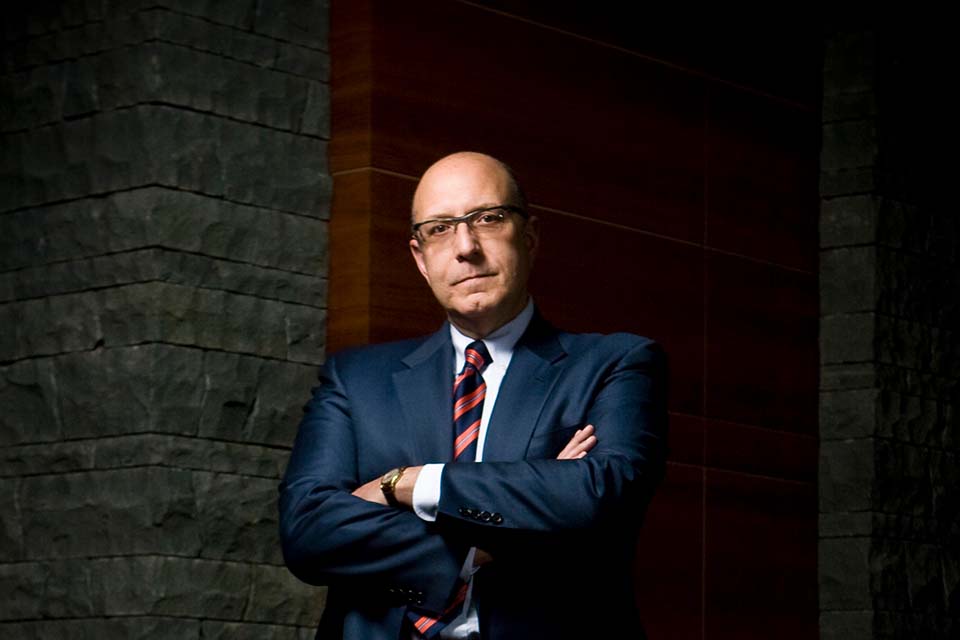A Roundabout Journey: Paul Argenti's Return to the English PhD Program

Photo Credit: Jason Johns
March 18, 2024
Abigail Arnold | Graduate School of Arts and Sciences
Paul Argenti first entered the Brandeis English Department as a graduate student in 1975. While he had begun his undergraduate studies at Columbia University as a pre-medical student, Argenti said that, after taking a nineteenth-century literature course with former Brandeis professor Sacvan Bercovitch, “I wanted to be who he was and teach English.” Bercovitch recommended that Argenti apply to Brandeis for graduate school, and he began the English PhD program there. After a couple of years, though, his professional career went in a completely different direction, and he ended up as Professor of Corporate Communication at Tuck School of Business at Dartmouth, where he has been for the last forty-three years. It’s never too late to follow your first love, however, and as of 2021, Argenti, while continuing to teach at Dartmouth, is back at Brandeis completing the English degree.
While Argenti was initially studying at Brandeis, he learned of a program at the Harvard Business School that trained advanced PhD students to teach communications. He was accepted to the program and soon became absorbed in that world, eventually leaving Brandeis to get a business degree at Columbia and start a communications program there. He was then offered a job teaching at Dartmouth. The dean who offered him the role said, "Try it out for five years,” Argenti said. “That was forty-three years ago.” But in the middle of the Covid-19 pandemic, when he’d been doing a lot of reading, Argenti felt like there was something he hadn’t completed. He wondered what would happen if he emailed the dean of GSAS about completing his program, “for the self-satisfaction of completing something I wanted to do.” Eric Chasalow, the dean at the time, thought it was a great idea and put Argenti in touch with John Burt of the English department, who is now his faculty advisor.
When Argenti re-entered the English PhD program in the fall of 2021, he found many changes and many joys. In the 1970s, he researched how nineteenth century literature was influenced by the Puritans, but now he’s completely changed his topic. “I’m trying to marry the two sides of my work,” he said, “and write about how business is perceived in literature and film. My list is full of works on that.” Reading through the books on his field list has been a pleasure for Argenti, who just finished Ayn Rand’s The Fountainhead and is next planning to listen to and read Eugene O’Neill’s Long Day’s Journey Into Night. “I’m jumping around reading everything in whatever order I feel like,” he said.
Argenti also feels that he approaches being a student and his relationship to his advisor in new ways, particularly having spent so long as a teacher himself. “I can read from a totally different perspective knowing the angle I’m taking on things and looking for that. I’m a smarter student in so many ways,” he said. He also praised Burt’s work as an advisor. “I look at the way John teaches me and I learn from him in a way I don’t think I would have before,” he said “I look at the way he teaches and compare it to my own practice. After having been the expert for so long, it’s been fun to go back and see someone who knows more. It also gives me humility as I see the art of his work as a scholar and teacher and what I still have to learn.”
Looking back at his non-linear journey, Argenti offered some advice to the self who first started Brandeis’s program. “I would have asked myself why I wanted to do it,” he said. “I think a lot of students go through life on a course without even thinking about where they are. I went to the right high school, right college, and saw only three or four logical things to do rather than thinking about what I really want to do and giving myself time to breathe and understand. I got there in a roundabout way.” While he isn’t sure he would have initially entered the program if he knew what graduate study of English would entail, he is ultimately glad he did: “It ended up serving me well.”
Argenti has incorporated what he learned from being a student of English throughout his career. At Dartmouth, he taught a combined “Narratives of Business, Business as Narrative” course with English professor Barbara Will, teaching business case studies as literature and novels as business case studies. “I look at things through the narrative of storytelling and write lots of cases, which are like little stories,” said Argenti. Furthermore, he said, without having spent his initial years in the English program, “I would not have gotten the jobs at Harvard and then Dartmouth, and I would not have had this life. I’m a professor at an Ivy League school, which is what I wanted, just not teaching English.” Argenti’s story shows that an academic journey need not be straightforward to be meaningful and that there is always a range of options. And who knows? As Burt tells him, he may have another career teaching English at the end of this.






